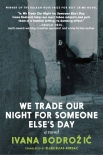We Trade Our Night for Someone Else's Day, Ivana Bodrozic [adventure books to read txt] 📗

- Author: Ivana Bodrozic
Book online «We Trade Our Night for Someone Else's Day, Ivana Bodrozic [adventure books to read txt] 📗». Author Ivana Bodrozic
The outbreak of war found him there. He was mustering resources to start a new movement for Croatia, sizzling with excitement at the very thought of all the weapons that would be rattling around him. His heart pounded faster at the sounds of the distant detonations approaching; the external state of incipient chaos was finally in sync with his inner self, understood by no one. He sniffed out the right people for the changes to come. Up onto the stage he clambered, sputtered all over the microphone, pumped his fist in the air. Every time someone said sir in a God-fearing voice, he knew for a certainty that they must be speaking to him. The most auspicious turn of events for him and his boys was when their country, which—as they’d announced to everyone—they were building anew, came under assault. This was perfect timing: he and his boys were compelled to rally to the country’s defense. Their reputation as defenders of the homeland was their only sliver of superiority over the crimes the other side was perpetrating, and for a few years they were lauded as heroes. When the collective madness began, the puzzle was a simple one to solve for the shrewder minds among them. What they required was a climate of fear, the flood of media articles on the attacks, the Chetniks, the enemies in our midst, and if the enemy failed to provide the fodder they needed, they’d cook up more discord themselves. The critical voices could be silenced readily enough using blackmail and threats; exceptions were rare. Special Police Officer Kirin, who had been dispatched to the negotiations, began raising his voice against the acts deliberately designed to incite strife, the attacks on Serbian civilians, the Croatian guns trained on Croatian villages. The more Ilinčić and his boys strove to persuade Kirin that this behavior was not serving our cause, the more intransigent Kirin became, until he was burned to death one day in a “car crash,” his car ablaze as it plunged off a bridge. Never was the man identified who’d driven the car that forced Kirin’s off the road; the police were too busy just then pursuing real criminals. The “car crash” gave Ilinčić and his boys the elbow room they wanted. Surviving Kirin’s death were his widow and twelve-year-old daughter. They were given well-meaning advice to accept the condolences, the flag, the medal, and then, at least for a time, clear out of Osijek. Everything else went smoothly, according to plan. By then so many people had been killed in the fighting that Josip and his boys were beginning to look like true-blue champions of the people. What would be the upside, anyway, of trumpeting the news to all and sundry that the battles, the bloodshed, and the sacrifice of an entire city had been concocted underground, in cahoots with the enemy? The ordinary people would never have understood how wars are really won anyway. Each of the two warring sides was led by a player of equal prowess. Ilinčić led one of the sides. At his behest the sun rose and set in Eastern Slavonia, and at his side every step of the way was a young man by the name of Schweppes, a bodyguard at the time, only nineteen, a murderer and criminal who’d come of age in the gambling establishments of the capital city. Schweppes was quick, agile, and invisible. Trailing behind him was a whole string of unsolved crimes, including an elegant car crash when, fancying himself the Hollywood tough guy and propelled by white-powder brashness, he forced the target and the target’s car into a ravine. Schweppes shadowed Ilinčić’s every step.
The other side was led by Stanko Velimirović. In November 1991, the esteemed Dr. Velimirović set aside everything else in his life to stand before the cameras of the international television crews, determined to bring down the last bastion of the Ustashas: the general hospital, crowded with civilians and the wounded. Under his watchful eye, drunken paramilitaries did what they did as if sober: they murdered the wounded, dumped the bodies in gaping pits in the ground, and raped all the women who’d stayed in the city. Shadowing Velimirović’s every step was a young man named Marko. Marko was an eighteen-year-old reservist, the sharpest sniper of his generation, loyal, silent, smart. Recruited from the rank and file of Yugoslav People’s Army regulars, he was a boy with no father, living with his ailing mother. Velimirović trusted Marko completely and commanded him—during the night the Serbs broke the seige and took control of the city—to organize security units for one of the mass graves, the pit. The next night, Marko showed up before dawn in Velimirović’s bedroom. He made the man’s wife kneel on the floor, bound her hands, duct-taped her face; Velimirović woke only when he felt a pistol muzzle thrust between his teeth, then a blow to the temple. He couldn’t see in the





Comments (0)